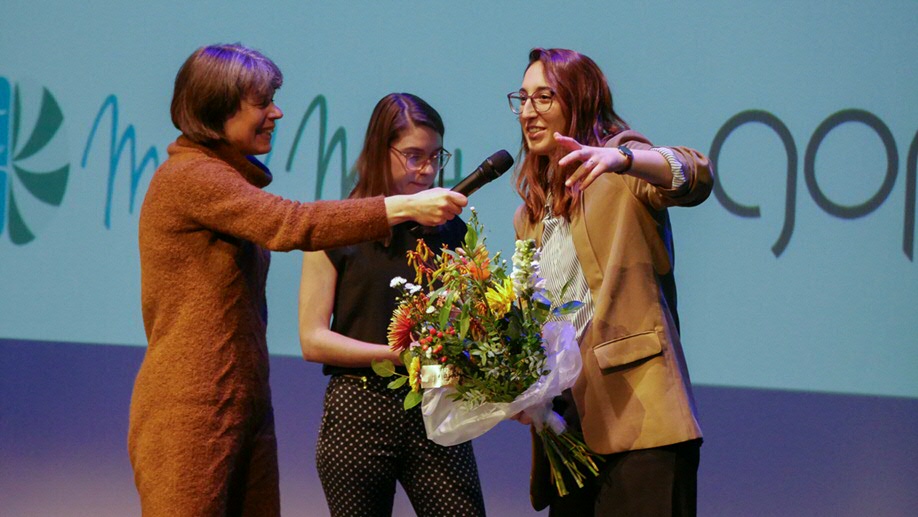UG-linguist in science competition finals
Why do you need a linguist in the operating room? This is what PhD student Effy Ntemou of the Faculty of Arts is going to explain in three minutes during the finals of the 3 Minute Thesis Competition tomorrow in Padua.
Ntemou is a linguist and does PhD research at the Centre for Language and Cognition at the Faculty of Arts, University of Groningen. She is studying how brain surgeons can remove a brain tumor without damaging the language ability of patients. "The best way to do that is if the patient is awake during surgery. The surgeon can then test whether the part of the brain where the tumor is located is language-related. This allows the surgeon to remove the cancerous tissue much more precisely without the patient losing language processes," Ntemou explains.
Tests with verbs
At the UG, much research has already been done on language loss due to brain damage and the development of language tests to be used in the operating room. "In the language tests that are already used in the operating room, a patient has to name objects based on pictures. But language consists of more than just nouns. We make sentences and that is more complex because we have to use verbs for that. That's why researchers at UG have developed a test, in which patients have to make sentences and use different types of verbs."
Using electric currents to disrupt brain activity
During the operation, the surgeon can precisely stimulate a small area of the brain with weak electrical currents, disrupting brain activity for a very short time. "The patient is then asked to make short sentences based on pictures," Ntemou explains. "For example, a picture of a crawling baby would be accompanied by the sentence, 'The baby is crawling.' But because of the disruption of brain activity, a patient at that moment may say something that is not correct, for example, 'The baby is smiling.' Thus, the surgeon knows that this area is language related, and should not be damaged during surgery. By stimulating different parts of the brain each time and doing the tests with the patient, the surgeon can mark a route, and knows exactly where to cut, and where not to cut."
Three minute thesis competition final
That Ntemou would make it to the finals of the 3 Minutes Thesis Competition was something she didn't think would happen when she applied for the competition. "I was advised by my PhD supervisor to become more skilled in science communication. I was happy to do that, because it's important to be able to talk about your research in a way that everyone understands. Most research is paid for by governments, so with everyone's tax money. So you have to do your best to make it clear to everyone what your research is about, right? The competition seemed like a good way to practice," Ntemou says.
Ntemou applied for the UG preliminary round, was chosen as one of twelve candidates to participate and promptly won the preliminary round. She was then chosen as one of the three finalists by the 41 participating European universities. During the finals of the 3 Minutes Thesis Competition, Ntemou will compete against PhD students from the University of Granada (Spain) and Aarhus (Denmark). Ntemou is not the first UG PhD student to reach the finals, but there has never been a Groningen winner. Ntemou: "The pressure is on!"
About the 3 Minute Thesis Competition
The 3 Minute Thesis Competition was developed by the University of Queensland (Australia), and is now organized on several continents. The European competition is organized by the Coimbra Group, an association of 41 European universities.

| Last modified: | 09 June 2022 3.42 p.m. |
More news
-
22 April 2025
Liekuut | The United States has always been less democratic than we think
The ferocity with which Donald Trump is eroding American democracy may seem unprecedented. Presidents have used their power to issue executive orders in the past, but not at the pace set by Trump. What if the US is less democratic than we think?
-
12 March 2025
Breaking news: local journalism is alive
Local journalism is alive, still plays an important role in our lives and definitely has a future. In fact, local journalism can play a more crucial role than ever in creating our sense of community. But for that to happen, journalists will have to...
-
11 March 2025
Student challenge: Starting Stories
The Challenge Starting Stories dares you to think about the beginning of recent novels for ten days.
